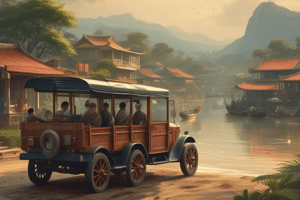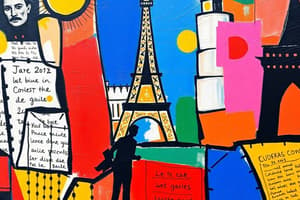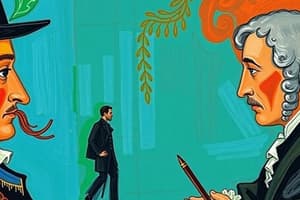Podcast
Questions and Answers
Which of the following works is associated with the Renaissance period in French literature?
Which of the following works is associated with the Renaissance period in French literature?
- Candide
- In Search of Lost Time
- Les Misérables
- Gargantua and Pantagruel (correct)
Which author is known for their contributions to existentialism in 20th century French literature?
Which author is known for their contributions to existentialism in 20th century French literature?
- Voltaire
- Sartre (correct)
- Flaubert
- Racine
What is the primary focus of literature during the Enlightenment period in the 18th Century?
What is the primary focus of literature during the Enlightenment period in the 18th Century?
- Epic poetry
- Tragedy and Comedy
- Reason and individualism (correct)
- Experimental narratives
Which literary movement is characterized by its focus on human suffering and individual vs. society themes?
Which literary movement is characterized by its focus on human suffering and individual vs. society themes?
Which work is a notable example of modernist literature from the 20th century?
Which work is a notable example of modernist literature from the 20th century?
Which poet is NOT considered a notable figure within the French poetry genre?
Which poet is NOT considered a notable figure within the French poetry genre?
Which of the following statements best describes the themes commonly found in 19th century French literature?
Which of the following statements best describes the themes commonly found in 19th century French literature?
Which award is one of the most prestigious for French novels?
Which award is one of the most prestigious for French novels?
Flashcards are hidden until you start studying
Study Notes
Overview of French Literature
- Definition: French literature encompasses written works produced in the French language, originating from France and French-speaking regions.
Historical Context
-
Middle Ages (5th - 15th Century):
- Emergence of epic poetry and religious texts.
- Notable works: "La Chanson de Roland."
-
Renaissance (15th - 17th Century):
- Influence of humanism and classical antiquity.
- Key figures: Rabelais, Montaigne.
- Notable works: "Gargantua and Pantagruel," "Essays."
-
Classical Period (17th Century):
- Emphasis on order, clarity, and balance.
- Important genres: Tragedy and Comedy.
- Key authors: Corneille, Racine, Molière.
-
18th Century (Enlightenment):
- Focus on reason, individualism, and societal critique.
- Key figures: Voltaire, Rousseau, Diderot.
- Notable works: "Candide," "The Social Contract," "Encyclopédie."
-
19th Century:
- Romanticism, Realism, Naturalism, and Symbolism movements.
- Key authors: Hugo, Flaubert, Zola, Baudelaire.
- Notable works: "Les Misérables," "Madame Bovary," "Germinal."
-
20th Century:
- Modernism and Postmodernism emerge.
- Key figures: Proust, Sartre, Camus, Beckett.
- Notable works: "In Search of Lost Time," "Nausea," "The Stranger," "Waiting for Godot."
Key Themes and Genres
-
Themes:
- Individual vs. society.
- Existentialism and absurdism.
- Nature of reality and perception.
- Love, death, and human suffering.
-
Genres:
- Poetry: Notable poets include Verlaine, Rimbaud, and Apollinaire.
- Novels: Diverse styles from romantic and realist to experimental narratives.
- Drama: Significant contributions to both classical and modern theatre.
Notable Awards
- Prix Goncourt: Prestigious literary award for French novels.
- Nobel Prize in Literature: Awarded to various French authors, including Sartre and Camus.
Influential Movements
- Existentialism: Focus on individual freedom and choice, prominent in the works of Sartre and Camus.
- Surrealism: Blurring the lines between reality and dreams, led by André Breton.
- Postmodernism: Challenging narratives and structures, notable authors include Derrida and Barthes.
Contemporary French Literature
- Trends include globalization, multiculturalism, and technological influences.
- New voices and perspectives emerging from diverse backgrounds.
Conclusion
- French literature has a rich history characterized by various movements, themes, and influential authors.
- Continues to evolve, reflecting modern societal changes and cultural dialogues.
Overview of French Literature
- Encompasses literary works in the French language from France and French-speaking regions.
Historical Context
-
Middle Ages (5th - 15th Century):
- Birth of epic poetry and religious texts.
- "La Chanson de Roland" is a notable work from this era.
-
Renaissance (15th - 17th Century):
- Humanism and classical antiquity significantly influenced literature.
- Key figures include Rabelais and Montaigne.
- Significant works: "Gargantua and Pantagruel," "Essays."
-
Classical Period (17th Century):
- Focus on order, clarity, and balance in literature.
- Prominence of tragedy and comedy as genres.
- Influential authors: Corneille, Racine, Molière.
-
18th Century (Enlightenment):
- Emphasized reason, individualism, and critique of societal norms.
- Influential figures include Voltaire, Rousseau, Diderot.
- Noteworthy works: "Candide," "The Social Contract," "Encyclopédie."
-
19th Century:
- Major movements: Romanticism, Realism, Naturalism, and Symbolism.
- Key authors: Hugo, Flaubert, Zola, Baudelaire.
- Important works: "Les Misérables," "Madame Bovary," "Germinal."
-
20th Century:
- Introduction of Modernism and Postmodernism.
- Prominent authors: Proust, Sartre, Camus, Beckett.
- Key works: "In Search of Lost Time," "Nausea," "The Stranger," "Waiting for Godot."
Key Themes and Genres
-
Themes:
- Conflict between individual and society.
- Exploration of existentialism and absurdism.
- Examination of reality and perception.
- Themes of love, death, and human suffering.
-
Genres:
- Poetry, with notable poets like Verlaine, Rimbaud, and Apollinaire.
- Novels displaying a range from romantic and realist to experimental styles.
- Drama with significant contributions to classical and modern theatre.
Notable Awards
- Prix Goncourt: A prestigious award for exceptional French novels.
- Nobel Prize in Literature: Recognizes various French authors, including Sartre and Camus.
Influential Movements
- Existentialism: Focused on freedom and choice; illustrated in works by Sartre and Camus.
- Surrealism: Aims to merge reality with dreams; led by André Breton.
- Postmodernism: Challenges traditional narratives and structures; notable figures include Derrida and Barthes.
Contemporary French Literature
- Trends highlight globalization, multiculturalism, and technological influences.
- Emergence of new voices and diverse perspectives in the literary landscape.
Conclusion
- French literature boasts a rich tapestry of movements, themes, and pivotal authors.
- Continues to evolve, reflecting contemporary societal shifts and cultural conversations.
Studying That Suits You
Use AI to generate personalized quizzes and flashcards to suit your learning preferences.




